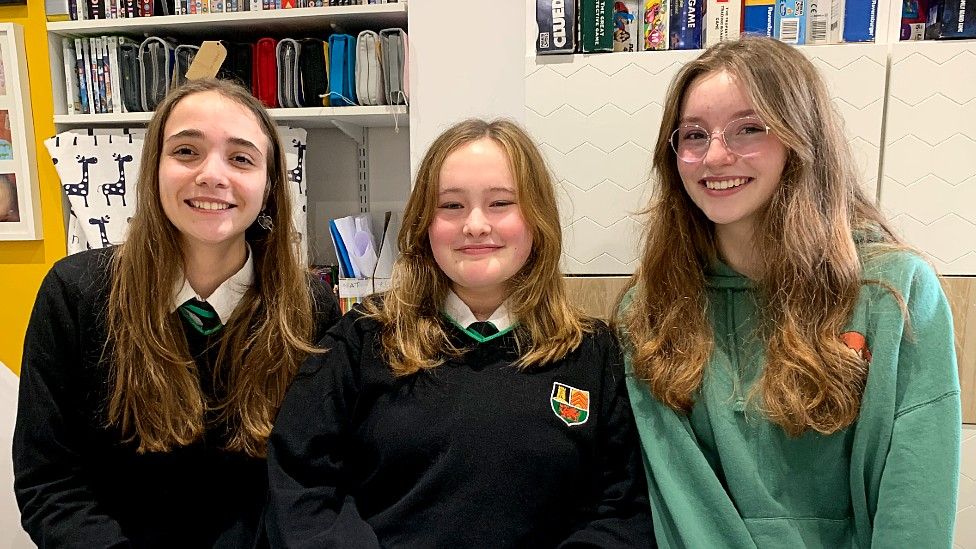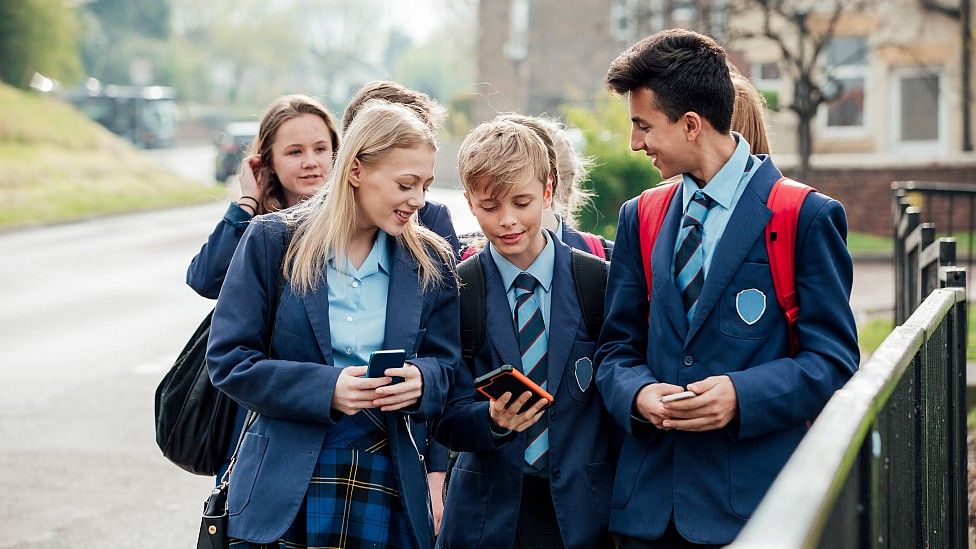Media
Social media: How (some) use can be good for teenagers
|
|

Like other teenagers, messaging each other on social media comes naturally to them. But does this add to – or detract from – their friendship?
New research has thrown up some welcome news for children and parents alike, many of whom worry about the amount of screen time young people have.
Dr Rebecca Anthony, a research associate at Cardiff University’s public health body Decipher said the findings arose while studying responses to the 2019 Student Health and Wellbeing Survey.

Cardiff University
“We used the survey to look at who young people were engaging with as well as how long they were spending online.”
And, for once, there was good news about screen time.
Better wellbeing was found to be associated with those who spent their time online speaking to their close and wider group of friends who they already knew offline.
Dr Anthony said it was a “very clear message” that spending time speaking to people online the teenagers did not know was associated with “much poorer wellbeing” and was stronger for teenage girls who only messaged people online.
The research may provide some welcome news after another survey found teenagers in Wales had exercised less and spent more time in front of a screen during the pandemic, with almost a quarter experiencing adverse mental health symptoms.
But how does Dr Anthony’s research translate to the three friends’ experiences?


Getty Images
The trio, now all 14 or 15, started using mobile phones in the last year of primary school, and at first just used WhatsApp to communicate with their closer friends.
This widened out after they moved to secondary school, when larger numbers of people would form messaging groups.
Sasha said: “In terms of WhatsApp, I honestly think I used it more [back then] because everyone had just gotten a phone and all the group chats were blowing up all the time.”
The girls said they generally found this app a positive thing as they found their feet in secondary school.
As they got older, different apps started to take over.
Ruby said: “The thing that people got addicted to on their phones was TikTok, but the way people talked to each other was Snapchat and Instagram.
“There’s more drama and things on Snapchat and Instagram. People get into arguments, and that’s more impactful on our lives.”
The girls agreed Snapchat was the main way larger groups communicate but, for their own more intimate friend group, they revert to WhatsApp.
‘It’s always there’
Ruby said that while messaging her close friends from home in the evenings was generally a positive experience, being in other group chats had sometimes left her with “a negative feeling, even if nothing awful has happened”.
Do they ultimately think technology has improved both their friendship and their happiness?
Katie said: “I think it does, because if you’re feeling really sad or bored or something, it’s always there.
“If you’re feeling really happy about something you can tell them now and it enhances how you’re feeling, and brings you more enjoyment about it.”
Sasha described it as a “comfort” that a person can always be contacted, even if it is to sort out an argument.
“You can text and say ‘sorry, I didn’t mean to say that’, whereas if you didn’t have that you would just have to sit there and think about it,” she said.


Evie Kwan
Evie Kwan, 17, is a Welsh Youth Parliament representative from Cowbridge, Vale of Glamorgan, with an interest in mental health.
She said the ability to check in with people, “ask how they are doing and if they need a chat or something face-to-face” was valuable.
“However, when it comes to things like loneliness, having that constant stream of knowing what everyone’s doing, having them message you constantly, it’s like a whole other world.”
She added: “It can make you feel isolated and lonely if you’re not participating in these chats in social media apps.”


Internet Matters
For Dr Linda Papadopoulos, psychologist and ambassador for online safety body Internet Matters, the most vital thing parents can do is get to know what their children are doing.
“Look out for how your kids are interacting online and how does it make them feel in the same way that you would with anything – they start a new club, they start a new school,” she said.
“Did your kid go from being open and happy to becoming very, very withdrawn? Did your kid go from being very quiet to being very, very agitated when you take their tech off them?”
She uses the analogy of the five-a-day fruit and vegetables health message.
“It’s wonderful that I connect with my friends online. But if that’s all I’m doing, that’s a problem.
“That’s one vegetable. The other vegetable is, have you had a play date? Have you gone out? Have you moved? Have you interacted – just by text or have you spoken?”
Dr Anthony said she had been surprised at how “switched on” some teenagers were with self-control, including turning off notifications when they were doing homework.
The girls have seemingly worked this out for themselves when it comes to talking online.
“As long as you’re able to control your limits, it’s positive,” said Katie.
Ruby added: “There are going to be people that have addictions to social media and then it will be a negative, but for people that can use it in moderation it’s always going to be a positive.”





Media
Rusty Foster Tracks Media Gossip From an Island in Maine – The New York Times


In a time when the headlines are dominated by wars and a divisive presidential campaign, the magazine-world rivalry between The Atlantic and The New Yorker doesn’t amount to much.
So you might have missed it when, on April 2, The Atlantic beat The New Yorker in three big categories at the 2024 National Magazine Awards.
But to Rusty Foster, who chronicles the media industry and internet culture in his daily newsletter, Today in Tabs, The Atlantic’s victory was big news.
Shortly after the awards ceremony, which took place at Terminal 5 in Manhattan, Mr. Foster tapped out a fanciful report for his audience of media obsessives. Under the headline “Shutout at the TK Corral,” he wrote that David Remnick, the editor of The New Yorker, “solemnly folded up and ate each of his prepared speeches as he watched The Atlantic win every category.”
Mr. Foster then turned his attention to Anna Wintour, the editorial director of Condé Nast, the publishing giant that owns The New Yorker, Vogue and other publications, writing that she “donned an emergency second pair of sunglasses” in reaction to the company’s poor showing.
A surprising thing about Today in Tabs — which has a knowing, satirical tone that has made it an enduring hit among media insiders — is that Mr. Foster writes it from the bucolic setting of Peaks Island, Maine, which is where he was when the National Magazines Awards ceremony took place.
He says he finds New York’s nonstop noise and crowds tiring, and his most recent visit to the city was last May, when he and the youngest of his three children stayed at a Times Square hotel and saw “Harry Potter and the Cursed Child” on Broadway.
One of his friends, Paul Ford, a writer, editor and tech entrepreneur, noted that Mr. Foster, the person, seems to have little in common with the media chronicler of Today in Tabs. “He’s a very New England guy,” Mr. Ford said. “When you meet this guy, if he told you he’s going to make a wooden canoe, you’d go, ‘Alright.’”
A Peaks Islander
Mr. Foster, 47, started Today in Tabs in 2013, when the industry he covers with a mix of affection and scorn was going through a crisis brought on, in part, by the rise of digital technology.
The news media business is in even worse shape now. The Los Angeles Times recently announced that it would slash its newsroom by more than 20 percent, Sports Illustrated has been gutted, and more than 400 union staffers at Condé Nast walked off the job this year after the company announced it planned a layoff. Vice, a onetime colossus of digital media, has filed for bankruptcy; and Gawker and The Awl, a pair of online publications that had an influence on Today in Tabs, are gone.
Amid the economic gloom, Mr. Foster has what many media outlets crave: a devoted readership willing to pay for content.
Around 10 percent of his 36,000 subscribers are paying readers, he said, who fork over $6 per month or $50 per year. That’s not quite three-bedrooms-in-Cobble-Hill money, but it allows Mr. Foster to make a living in media at a time when many veteran journalists are struggling to find jobs.
From the start, he has written Today in Tabs from Peaks Island, a nearly one-square-mile patch of rocky land in Casco Bay. Reachable only by ferryboat, it has roughly 900 full-time residents. Aside from a few homey dining establishments (including Milly’s Seaside Skillet Kitchen and the Cockeyed Gull Restaurant) and a basic supermarket, there’s not much commerce to speak of.
The locals have an independent character. Many live in weather-beaten cottages and drive junker cars that don’t require a state inspection sticker if kept on-island. Since the 1880s, Peaks Islanders have mounted six unsuccessful campaigns to secede from Portland, which is three miles away and governs the island.
On a cool, breezy morning, Mr. Foster led me from the ferry to his 2001 Chevy Suburban, which he had converted to an “overlander” vehicle to take his family on road trips to Yellowstone National Park and other sites. The interior had built-in beds. The roof held two elongated water storage tanks.
He didn’t say much during the short drive. The pavement gave way to a dirt road, and he came to a stop in front of a modest two-story fixer-upper built in the early 1900s.
In the back yard, Mr. Foster’s island car, a Jeep Liberty, was up on jacks. Nearby was a chicken coop he had built for the flock of laying hens his family kept when the kids were little.
Inside, he sat at the kitchen table and unwrapped a croissant that I had brought along from Portland. As his Rhodesian Ridgeback, Sam, shuffled underfoot for crumbs, he spoke in quiet tones about growing up in Massachusetts and spending happy childhood summers on Peaks Island, where his grandparents had a cottage.
At the College of William & Mary, in Williamsburg, Va., he was all set to major in film studies, only to drop out during his senior year. While there, he met Christina Fischer, a history major. They married and moved to San Francisco in 2000. Mr. Foster worked as a programmer for an internet startup in the waning days of the dot-com bubble, but he didn’t care for the city or the tech scene, and the couple made the move to Peaks Island in 2001.
“A lot of things happened in a very short period of time — and then we moved here, and nothing happened,” Mr. Foster said with a laugh.
He recalled his first brush with the internet in the late 1980s, when his father, who worked as a franchise developer for Dunkin’ Donuts, signed up for CompuServe, one of the first online services. Mr. Foster learned to type on its chat function, CB Simulator. For a self-described shy, nerdy teenager, the ability to meet people online was revelatory.
“What I discovered was that writing is the easiest way for me to talk to people,” he said. “And it’s the way I feel the most that I’m expressing myself.”
Mr. Foster is something of a Zelig-like figure in internet history, popping up in key roles at various stages in the web’s development. He was an influencer long before that was even a thing. A group blog he created in 1999, Kuro5hin (motto: “Technology and Culture, from the Trenches”), was one of the first sites that allowed users to post comments and create their own blog pages.
Kuro5hin became a gathering place for early adopters and — along with Slashdot and Wikipedia — helped shape the open-source culture of the early internet. Mr. Foster, then known as “Rusty from Kuro5hin,” made plenty of friends online as he built a career as a freelance programmer.
He was an early shareholder in Sports Blog Nation, the precursor to Vox Media. In 2013, he was hired by Stephen Colbert and the comedy writer Rob Dubbin to help develop Scripto, a scriptwriting software used by “The Colbert Report” and “The Daily Show.” Now and then, those jobs took him to New York. But even in his coding days, Mr. Foster found that he got along better with journalists than tech people.
“There aren’t a lot of tech leaders that I find interesting,” he said in his kitchen. “I’m a language person. Media people come from words. I like their approach to the world. They have skeptical curiosity.”
He started Today in Tabs almost on a whim, thanks to the encouragement of Caitlin Kelly, who was then a senior web producer for The New Yorker. (The newsletter’s keyword, “tabs,” is internet shorthand for browser windows as well as slang for the latest articles and memes that people were getting worked up about online.) Mr. Foster laid out the Today in Tabs origin story in a 2021 edition of his newsletter.
“One day in 2013, underemployed and wasting time on Twitter, I tweeted ‘Today in Tabs,’” he wrote. In reply, Ms. Kelly tweeted, “wait is this a e-newsletter I can subscribe to?”
Mr. Foster continued: “‘A e-newsletter?’ I thought, in the amusing old-timey patois of 2013, ‘Why ever not?’ So that afternoon I sent the first Today in Tabs to 25 subscribers, beginning with this NY Post story about love and misogyny and sandwiches.”
Soon enough, he was tracking “the insidery squabbles and hate reads and high-minded-if-fleeting-feuds” in the media world, as The New York Observer put it in a 2014 profile. Today in Tabs quickly became a favorite of the web-savvy journalists who worked at Buzzfeed, Vox and other digital outlets.
Mr. Foster shut it down in 2016 because his job at Scripto demanded too much of his time. By 2021, he was back up and posting, first on Substack and then on the publishing platform Beehiiv. Restarting Today in Tabs, he said, was his attempt to leave programming behind and make a living as a writer.
Though he has written for The New Yorker, The Awl and other publications, Mr. Foster has never held a staff position as a journalist. And although he now makes his living tracking the media, he said he still thought of it as a hobby — “and it’s a weird hobby to have.”
Some people golf or sport-fish. Mr. Foster likes immersing himself in burn reviews of the new essay collection by Lauren Oyler and going down the rabbit holes of the Kate Middleton saga. In other words, putting together a newsletter about the media and online life comes naturally to him.
“It’s not a job so much as a thing my brain does,” he said. “If I read a certain amount of content every day, then my brain will produce 800 words about it. As long as I can sit and write that down, I’m good.”
Deadline Days
Unlike other industry newsletters, Today in Tabs, which is published four or five days a week, does not deliver scoops or exclusive interviews with boldface names. Billed as “your favorite newsletter’s favorite newsletter,” it is an 800-word snapshot of what people (mostly journalists) are talking about in the moment.
What readers are really paying for is Mr. Foster’s sensibility.
He writes in a cynical but still bright-eyed, quirkily punctuated, jokey style — internet voice — that will be recognizable to anyone who remembers Gawker, The Awl or, further back, Suck.com.
Matt Levine, an opinion columnist for Bloomberg, called Mr. Foster “a tremendous stylist,” adding that Today in Tabs was an inspiration for his own newsletter, Money Stuff. “I’m on the internet all day, on Twitter all day, and it’s this shared psychosis,” Mr. Levine said. “Rusty captures the nonsense of the day but in a stylistic way that makes it seem like literature.”
Elizabeth Lopatto, a senior writer for the Verge, says Mr. Foster’s appeal lies in his geographic and psychic remove from what he writes about. “As much as I love media reporters, there’s something to be said for that outside perspective,” Ms. Lopatto said.
“People read to have fun,” she added. “I get the sense that Rusty is writing that newsletter trying to make himself laugh.”
Though a creature of the internet, Mr. Foster is not unlike an old-school newspaper reporter in his adherence to a daily deadline.
Mr. Foster’s wife works as a data systems specialist for the Maine Coalition to End Domestic Violence, a nonprofit, working from home or in Augusta. His three children, Mica, 19, Calvin, 16, and Ash, 11, are all in school. That leaves him padding around the house for much of the day.
He gets up around 8 a.m. and moseys down to the kitchen to make coffee. He takes a mug upstairs and gets back in bed, where he sits with his laptop, catching up on what’s happening online. If something piques his interest, he bookmarks it in a file.
“That’s my notebook,” Mr. Foster said. “It’s really just a list of links. And hopefully I remember why I bookmarked it.”
He checks in with a Slack channel that includes reporter friends who give him a sense of what journalists are talking about. A group of Today in Tabs enthusiasts on the social media platform Discord drop off more links — in effect, they are Mr. Foster’s volunteer stringers.
He makes lunch and takes Sam for a walk down the dirt road. He aims to start writing by 1 p.m. and to post by 4 or 5. If he hasn’t gotten going in earnest by 3, panic sets in.
He writes at a small desk in his bedroom. On the wall is a plaque he had made that says: “Rusty Foster, Weird Media Gremlin.”
Tabs is structured like a late-night talk show, starting with a monologue that allows Mr. Foster to riff on a trending topic at length. One day in February, his opening subject was the financier Bill Ackman, whose public fight against his alma mater, Harvard, had made him the subject of several articles, a phenomenon Mr. Foster dubbed “the Ackmanaissance.” Mr. Foster wrote that a Washington Post profile of Mr. Ackman made him seem like “an overconfident dimwit”; from there, he dove into a New York magazine piece on the man to come up with “the eight best New York Magazine roasts of Bill Ackman that he won’t understand.”
The Today in Tabs opener is followed by a middle section of rapid-fire links to articles and news items, many of them written in insidery lingo. Here, Mr. Foster might also reveal his pet causes and pet peeves (One hyperlink reads: “Molly White On Chris Dixon’s Dumb Crypto Book”). Each installment of the newsletter ends with a musical guest — or, rather, an embedded song video, usually by an indie band.
His fellow Peaks Islanders have little idea what he does for a living or that in certain circles he is known as “Rusty from Tabs.” He has not been profiled in The Portland Press Herald or The Peaks Island News. He tells people who ask that he’s a writer. When they ask him what he writes about, he struggles to explain what it is that a weird media gremlin does.
“I usually tell them, ‘I make jokes about the news,’” he said.
For someone who has been online 35 years, Mr. Foster retains a remarkable ability to disconnect from the machine. He’s an engaged parent, as well as an avid kayaker and hiker. He also belongs to a wilderness search-and-rescue team that does summer shifts in Baxter State Park, in northern Maine. On weekends, he mostly stays off the internet.
“I compartmentalize a lot,” he said. “I try to be doing the thing that I’m doing when I’m doing it.”
His readers will soon have to match his ability to manage an online obsession. Starting July 2, Mr. Foster is taking a break from Today in Tabs to hike the Appalachian Trail with his oldest child, who is set to graduate from college in May and move overseas in the fall.
In addition to a good pair of trail runners and a waterproof tent, Mr. Foster plans to pack a six-ounce folding keyboard and his smartphone for the 2,200-mile journey. As he has already informed his subscribers, he will start a new newsletter called Today on Trail. More than 2,000 people have signed up to pay Mr. Foster a to-be-determined fee for his “chronicle of what happens in my brain on a five-month hike.”
As he spoke further of his planned hiatus from Today in Tabs, he considered what it would be like to spend several months without a Wi-Fi signal, a prospect that might strike terror, and perhaps a bit of envy, into his readers.
“I was like, What if I got offline a little bit to see what’s in my own head?” Mr. Foster said. “It’s been about three and a half years of doing Tabs consistently. I wonder if there’s something else for me to discover that I could write, if I were not constantly living in that information-soaked environment.”
Media
Here’s what Russian media is saying about Marjorie Taylor Greene’s push to end Ukraine aid – CNN


Here’s what Russian media is saying about Marjorie Taylor Greene’s push to end Ukraine aid
CNN’s Erin Burnett shows how Russian state media is giving Rep. Marjorie Taylor Greene (R-GA) positive coverage over her campaign to end US aid to Ukraine.
Media
The media industry is dying – but I can still get paid to train AI to replace me – The Guardian


Say what you like about the Germans, you can always count on them to find just the right word for anything. Take “weltschmerz”, for example, which roughly translates to “world pain”. It signifies despair at the suffering in the world – and a deep anguish that stems from knowing that a better world is possible. Is there a more apt encapsulation of the current moment?
For the past six months I, like many others, have been suffering from an acute case of weltschmerz. As someone of Palestinian heritage I have been weighed down by survivor’s guilt as I’ve watched the unfolding genocide in Gaza. For a while, I didn’t have the emotional energy to write. The only way I could get out of bed and make it through the day was by avoiding the news completely. Which … isn’t an ideal scenario when you largely write about the news for a living. So, at one point, I decided on a career pivot and applied for various non-writing jobs, including one at a dog food manufacturer. Reader, I was rejected. In fact, I didn’t even make it to the first round of interviews; I was humbled by a dog’s dinner.
Obviously, I am writing again now. But for practical purposes I keep an eye on what else is out there. The media industry, after all, seems to be in freefall; it’s always good to try to secure a parachute, just in case. And, the other day, one seemed to present itself to me in my LinkedIn messages. According to an automated missive from an AI company, I have the perfect set of skills to help them write the first draft of AI history. I could, the generic message enthused, get “up to $15 [£12] an hour”, to coach an AI model “by assessing the quality of AI-generated writing … and crafting original responses to prompts”.
In other words: I could get paid less than the New York minimum wage to train an AI model to take over my job. Is there a German word to describe that particular situation, I wonder? I’ll have to ask ChatGPT.
Arwa Mahdawi is a Guardian columnist
-
News19 hours ago
Loblaws Canada groceries: Shoppers slam store for green onions with roots chopped off — 'I wouldn't buy those' – Yahoo News Canada
-
News22 hours ago
Toronto airport gold heist: Police announce nine arrests – CP24
-
Investment18 hours ago
Saudi Arabia Highlights Investment Initiatives in Tourism at International Hospitality Investment Forum
-
Business18 hours ago
Rupture on TC Energy's NGTL gas pipeline sparks wildfire in Alberta – The Globe and Mail
-
Art18 hours ago
Squatters at Gordon Ramsay's Pub Have 'Left the Building' After Turning It Into an Art Café – PEOPLE
-



 Tech23 hours ago
Tech23 hours agoVenerable Video App Plex Emerges As FAST Favorite – Forbes
-



 Tech11 hours ago
Tech11 hours agoCytiva Showcases Single-Use Mixing System at INTERPHEX 2024 – BioPharm International
-



 Sports21 hours ago
Sports21 hours agoGame in 10: Maple Leafs squander multi-goal lead to Florida, draw the Boston Bruins in the first round – Maple Leafs Hot Stove




